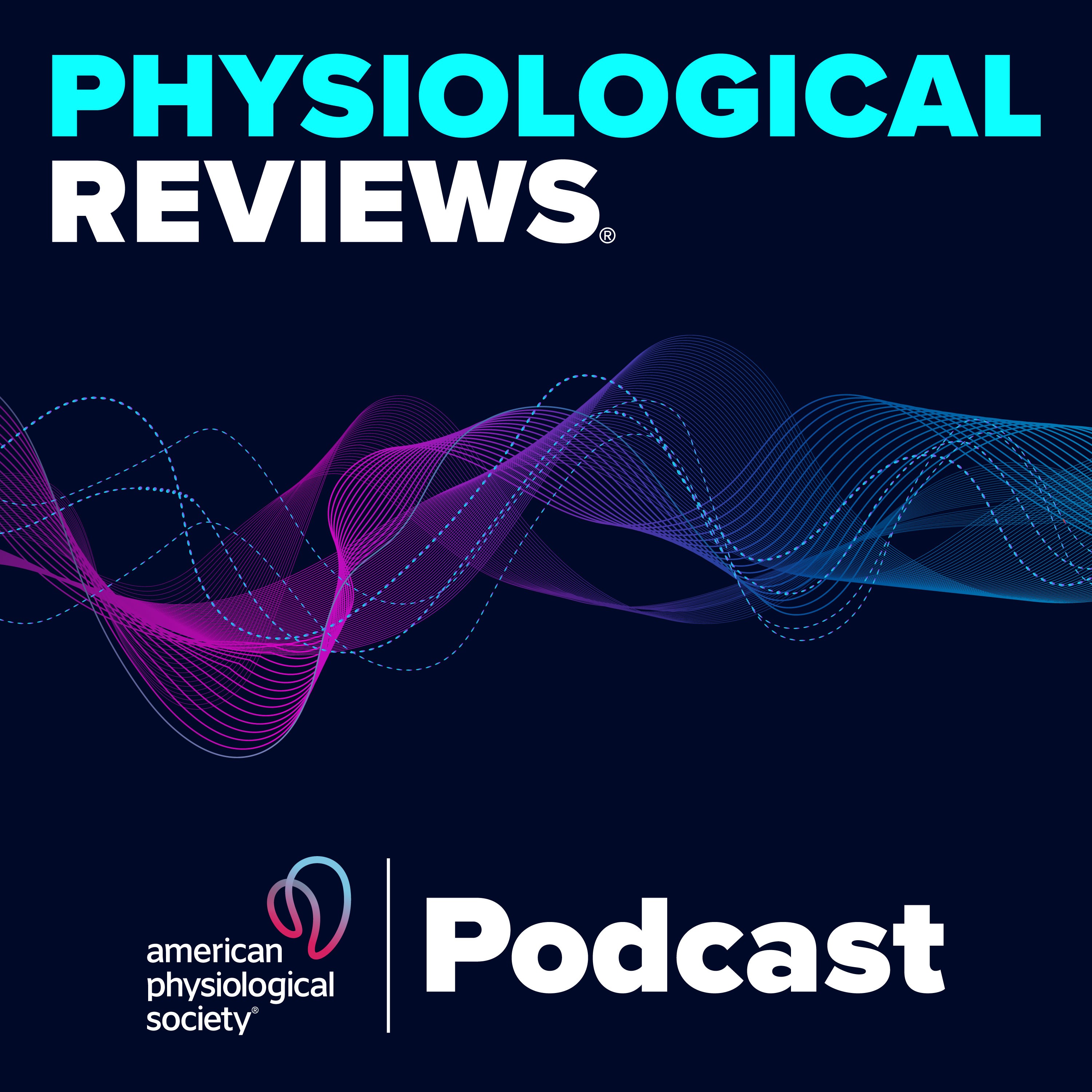
7.1K
Downloads
31
Episodes
Each episode of the Physiological Reviews podcast features commentary and discussion of newly published articles in the journal, which provides state-of-the-art, comprehensive, and high-impact coverage of timely issues in the physiological and biomedical sciences. Physiological Reviews articles appeal to physiologists, neuroscientists, cell biologists, biophysicists, and clinicians with special interest in pathophysiology. The journal is very useful in teaching and research because it provides non-biased and clearly written updates on important developments.
Each episode of the Physiological Reviews podcast features commentary and discussion of newly published articles in the journal, which provides state-of-the-art, comprehensive, and high-impact coverage of timely issues in the physiological and biomedical sciences. Physiological Reviews articles appeal to physiologists, neuroscientists, cell biologists, biophysicists, and clinicians with special interest in pathophysiology. The journal is very useful in teaching and research because it provides non-biased and clearly written updates on important developments.
Episodes
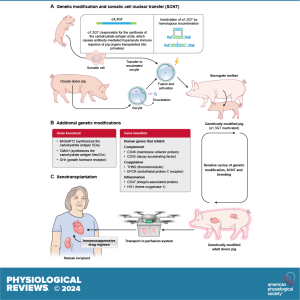
Monday Jun 17, 2024
Xenotransplantation from Genetically Modified Pigs to Humans
Monday Jun 17, 2024
Monday Jun 17, 2024
In our latest episode, Physiological Reviews Editor-in-Chief Dr. Sadis Matalon (University of Alabama at Birmingham) interviews authors Dr. Leigh Peterson (Executive Vice President for Product Development and Xenotransplantation at United Therapeutics Corporation) and Professor Sir Magdi Yacoub (Professor of Cardiothoracic Surgery at the National Heart and Lung Institute at Imperial College London, and Founder and Director of Research at the Harefield Heart Science Centre and Aswan Heart Centre). The authors have published a comprehensive review on xenotransplantation. Listen as they discuss the steps necessary to immunologically modify pigs to avoid acute rejection and minimize chronic rejection, as well as the main differences between the GalSafe and the 10GE pigs described in the article. Given that the American Physiological Society launched their Women’s Health Research Initiative in spring 2024, we discuss how xenotransplantation and women’s health research are connected. What are the next important developments in this field? Listen to find out more.
Leigh Peterson, Magdi Yacoub, David Ayares, Kazuhiko Yamada ,Daniel Eisenson, Bartley P. Griffith, Muhammad Mohiuddin, Will Eyestone, J. Craig Venter, Ryszard T. Smolenski, and Martine Rothblatt Physiological Basis for Xenotransplantation from Genetically-Modified Pigs to Humans: A Review Physiological Reviews, published June 7, 2024. DOI: 10.1152/physrev.00041.2023
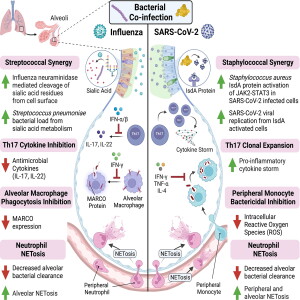
Thursday Apr 25, 2024
Community-Acquired Bacterial Coinfections and COVID-19
Thursday Apr 25, 2024
Thursday Apr 25, 2024
In our latest episode, Dr. Farrah Kheradmand (Baylor College of Medicine) interviews Dr. Kevin Harrod (University of Alabama at Birmingham) about his article by Patton et al. on community-acquired bacterial coinfections and COVID-19. In the early days of the pandemic when physicians were treating critically ill COVID patients, there was no standard definition for bacterial coinfections in this cohort. However, as the field has moved forward with understanding how bacterial coinfections contribute to the mortality of COVID patients, Dr. Harrod and co-authors have worked to refine the definition of bacterial coinfections to provide a more unified way to report the prevalence of this important clinical problem. While it is often necessary to treat critically ill hospitalized COVID patients with antibiotics before sampling or culture results, Dr. Harrod and co-authors identify that this may mask the true prevalence of bacterial coinfections. Listen as Dr. Kheradmand and Dr. Harrod discuss linkages between carriage, viral infection, and secondary bacterial infections, as well as the pathophysiological ways that fungi may coinfect COVID patients. Are patients with underlying cystic fibrosis more prone to COVID infection? Listen now to learn more.
Michael John Patton, Amit Gaggar, Matthew Might, Nathaniel Erdmann, Carlos J. Orihuela, and Kevin S. Harrod Community-acquired bacterial coinfections and COVID-19 Physiological Reviews, published October 16, 2023. DOI: 10.1152/physrev.00010.2023
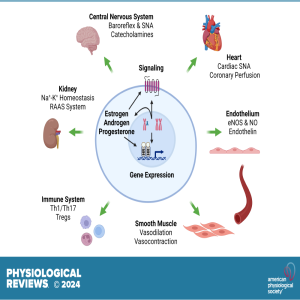
Thursday Apr 11, 2024
Sex Differences in Blood Pressure Regulation and Hypertension
Thursday Apr 11, 2024
Thursday Apr 11, 2024
The topic of hypertension is of paramount clinical importance as a significant risk factor for cardiovascular disease, myocardial infarction, stroke, and kidney disease. Sex differences in blood pressure regulation play a major role in the pathophysiology of hypertension. In the episode, Dr. Carol Ann Remme (University of Amsterdam) interviews Dr. Thu Le (University of Rochester) about her new Review in Physiological Reviews on the renal, hemodynamic, and hormonal mechanisms of sexual dimorphism in blood pressure homeostasis. We discuss sex chromosome effects, hormonal changes, potential sex differences related to innate and adaptive immunity, and the clinical relevance of animal models to develop new therapeutic targets. Listen now and learn more.
Erika R. Drury, Jing Wu, Joseph C. Gigliotti, Thu H. Le Sex differences in blood pressure regulation and hypertension: renal, hemodynamic, and hormonal mechanisms Physiological Reviews, published October 16, 2023. DOI: 10.1152/physrev.00041.2022
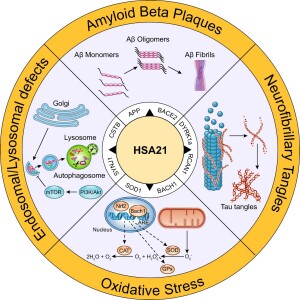
Tuesday Jan 30, 2024
Amyloid beta-Peptide and Oxidative Stress in Alzheimer Disease Pathogenesis
Tuesday Jan 30, 2024
Tuesday Jan 30, 2024
In this episode of The Physiological Reviews Podcast, Professor Giovanni Mann (King’s College London) interviews authors Prof. Marzia Perluigi (Sapienza University of Rome) and Prof. D. Allan Butterfield (University of Kentucky) about their recently published Review on the oxidative stress hypothesis of Alzheimer Disease. The authors provide a comprehensive overview of amyloid beta-peptide associated mechanisms, the use of redox proteomics to define roles of lipid and protein oxidation, and the antioxidant strategies utilized to modulate the progression of Alzheimer Disease (AD) in order to improve the quality of life for individuals with this severe disorder. Prof. Perluigi explains that because the brain is particularly susceptible to free radical damage, it is likely that lipid peroxidation is among the initiating toxic events in AD pathophysiology, with amyloid deposits reacting with membrane lipids that in turn target other cellular components such as proteins and nucleic acid. Listen as we discuss the role of astrocytes in the pathogenesis of AD, as well as the utility of animal models to plan preclinical trials and clarify molecular mechanisms involved in neuropathology of AD. Come for the discussion of the role that oxidative stress plays in the pathogenesis of AD, and stay for the illuminating conversation about the paths Prof. Butterfield and Prof. Perluigi have followed in pursuing their research training and careers in science with enthusiasm, dedication, and willingness to develop international research collaborations in the field of redox biology and chemistry associated with Alzheimer Disease.
Marzia Perluigi, Fabio Di Domenico, and D. Allan Butterfield Oxidative damage in neurodegeneration: roles in the pathogenesis and progression of Alzheimer disease Physiological Reviews, published July 19, 2023. DOI: 10.1152/physrev.00030.2022
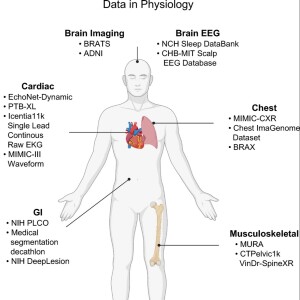
Wednesday Sep 20, 2023
AI in Physiology and Healthcare
Wednesday Sep 20, 2023
Wednesday Sep 20, 2023
As Sir Winston Churchill once said, “Where there is great power, there is great responsibility.” This is the overarching context of our latest episode about the future of artificial intelligence (AI) in physiology and healthcare. Listen as host Dr. Ryan Melvin (University of Alabama at Birmingham) interviews author Dr. James Zou (Stanford University) about the Review by Zhang et al. on “Leveraging Physiology and Artificial Intelligence to Deliver Advancements in Healthcare AI in Physiology and Healthcare.” The authors discuss an important transition in AI –the shift from model development to model deployment, while keeping at the forefront the goal of achieving positive real-world impacts by using AI in healthcare workflows. Zou and co-authors identify 3 key factors in this gap between development and deployment: ensuring AI works reliably and robustly across diverse populations, ensuring the financial sustainability of AI models, addressing new regulatory challenges for AI algorithms. FDA regulators are presented with unique challenges regarding how to continuously evaluate and monitor AI algorithms, while still allowing developers to update algorithms in a relatively frictionless way that ensures algorithms’ behavior is safe and robust. Does AI face a generalizability crisis? According to Dr. Zou, this is an ongoing issue. Instructive fine-tuning, which is intended to make iterative large language models safer, can sometimes lead to surprising AI behavior changes. On the topic of AI and authorship, the experts acknowledge that it is becoming increasingly difficult to distinguish if text is written by AI or by humans, as AI becomes more aligned with human behaviors. This may present unique opportunities, according to Dr. Zou. There are many types of text where human authors would benefit from AI support, for example in generating code and figures, and improving writing quality and precision. In the end, however, humans must take final responsibility for the accuracy of all statements in scholarly articles. How can the medical field play a role in shaping the metrics by which we judge generative AI? Listen to find out.
Angela Zhang, Zhenqin Wu, Eric Wu, Matthew Wu, Michael P. Snyder, James Zou, and Joseph C. Wu Leveraging Physiology and Artificial Intelligence to Deliver Advancements in Healthcare Physiological Reviews, published July 19, 2023. DOI: 10.1152/physrev.00033.2022
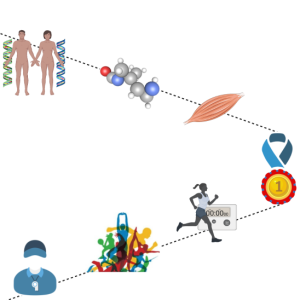
Tuesday Aug 29, 2023
The Molecular Athlete: Exercise Physiology from Mechanisms to Medals
Tuesday Aug 29, 2023
Tuesday Aug 29, 2023
What are the key physiological adaptations attained in exercise regimens used by elite athletes to achieve peak performance? In our latest episode of The Physiological Reviews Podcast, Editor-in-Chief Dr. Sadis Matalon (University of Alabama at Birmingham) interviews author and Physiological Reviews Associate Editor Dr. Christoph Handschin (University of Basel, Switzerland) about the new Review by Furrer et al. As Dr. Handschin explains, the basis of all types of muscle adaptations is repeated contractions, but how this is done in terms of training intensity, volume, form, and frequency can dramatically affect training outcomes. Athletes and coaches try to develop the best strategies for training periodization for performance to peak at the time of competition. What roles do sleep, diet, and environment, such as altitude, play in enhancing (or diminishing) exercise performance? Listen as Dr. Matalon and Dr. Handschin discuss experimental and natural product-based performance enhancing substances, wearable devices for tracking exercise performance, and the genetic makeup of individuals that ultimately differentiates athletes from Olympic athletes.
Regula Furrer, John A. Hawley, and Christoph Handschin The molecular athlete: exercise physiology from mechanisms to medals Physiological Reviews, published April 23, 2023. DOI: 10.1152/physrev.00017.2022

Thursday Jun 01, 2023
Genome-wide Association Studies of Cardiovascular Disease
Thursday Jun 01, 2023
Thursday Jun 01, 2023
Genetics studies, including genome-wide association studies (GWAS), play an increasingly important role in physiology and pathophysiology studies of cardiovascular disease. Listen as Deputy Editor Dr. Carol Ann Remme interviews authors Prof. Jeanette Erdmann (University of Lübeck, Germany) and Prof. Connie Bezzina (Amsterdam University Medical Center, Netherlands) about their latest Review in Physiological Reviews by Walsh et al. GWAS are aimed at identifying genetic variants for specific traits, and it is essential to study genetic variants in order to understand an individual’s susceptibility to develop specific diseases. Understanding the genetic basis of a disease can lead to identification of therapeutic targets for clinical intervention. Listen as these experts discuss how GWAS can be applied to study both rare disorders, for example Brugada Syndrome, as well as common disorders such as myocardial infarction. The possibilities are numerous for GWAS, including the identification of novel pathophysiological insights into cardiovascular disease mechanisms, as well as (future) development of clinically applicable polygenic risk scores. Listen now to learn more.
Roddy Walsh, Sean J. Jurgens, Jeanette Erdmann, and Connie R. Bezzina Genome-wide association studies of cardiovascular disease Physiological Reviews, published April 18, 2023. DOI: 10.1152/physrev.00024.2022
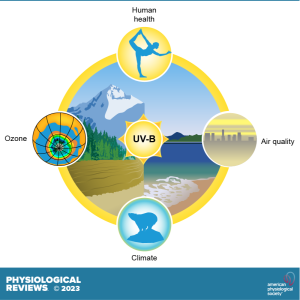
Tuesday Apr 25, 2023
Effects of Climate Change on Ozone and UV-B
Tuesday Apr 25, 2023
Tuesday Apr 25, 2023
How do changes in concentration of stratospheric ozone impact human health and the global ecosystem? In our latest episode Editor-in-Chief Dr. Sadis Matalon interviews lead author Professor Christos Zerefos about the recent Review titled, “The long-term variability of human health related solar ultraviolet-B radiation doses from the 1980s to the end of 21st century.” Because stratospheric ozone is the protective layer which screens harmful UV-B solar radiation, ozone depletion impacts diseases of the eyes and the development of skin cancers. The Montreal Protocol is an international treaty signed in 1987 to protect the ozone layer by eliminating the use of chlorofluorocarbons, which deplete the ozone layer and consequently increase harmful solar ultraviolet-B radiation reaching the earth. By some estimates, according to Professor Zerefos, the Montreal Protocol has prevented 2 million additional cases of melanoma and other skin cancers per year worldwide. Listen as we discuss how global warming will interfere with the expected recovery of the ozone layer by introducing regional changes in UV-B and subsequent detrimental effects on human health. Work continues to monitor global ozone levels because, as Professor Zerefos says, “Science never stops.” He also emphasizes the need to continue our protection from excess exposure in UV-B solar radiation in the decades to come. Listen now to learn more.
Christos Zerefos, Ilias Fountoulakis, Kostas Eleftheratos, and Andreas Kazantzidis The long-term variability of human health related solar ultraviolet-B radiation doses from the 1980s to the end of 21st century Physiological Reviews, published April 17, 2023. DOI: 10.1152/physrev.00031.2022
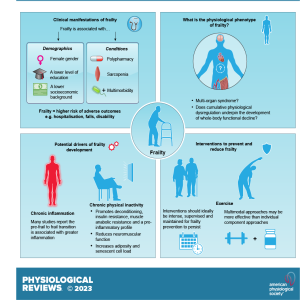
Thursday Feb 02, 2023
Human Frailty and Its Modulation by Physical Activity
Thursday Feb 02, 2023
Thursday Feb 02, 2023
Physiological Reviews Associate Editor Prof. Christoph Handschin speaks with Prof. Paul L. Greenhaff and Prof. Janet M. Lord about their article “Multisystem Physiological Perspective of Human Frailty and Its Modulation by Physical Activity,” published in the April 2023 issue of Physiological Reviews.
Prof. Greenhaff is Professor at the School of Life Sciences at the University of Nottingham and is deputy director of the Medical Research Council (MRC)-Versus Arthritis Centre for Musculoskeletal Ageing Research.
Prof. Lord is Professor at the Institute of Inflammation and Ageing at the University of Birmingham and is the director of the MRC-Versus Arthritis Centre for Musculoskeletal Ageing Research.
- Introduction of the authors [1:06]
- What does the term ‘frailty’ actually mean, and how is it clinically defined? [2:49]
- Are there specific risk factors that increase the chance of becoming frail? [5:18]
- What interventions are useful to guard against frailty? [6:55]
- How important will mechanistic aspects of frailty be in our understanding and treatment of frailty? [13:55]
- Are there things we can do with regard to prevention, the mindset of patients and physicians, and interventions in the clinic? [21:10]
- What advice do the authors have to minimize the impact of frailty, regardless of age? [23:15]
- The importance of remaining mentally active [25:55]
Subscribe to the podcast on Apple Podcasts, Google Podcasts, Spotify, and Amazon Music to receive immediate notification when new episodes are available.
Browse recent articles on our website.
Be sure to let your colleagues know about the podcast, and please rate and review it wherever you listen to it.
Follow the journal on Twitter and Facebook.
Listen to other podcasts produced by the American Physiological Society.
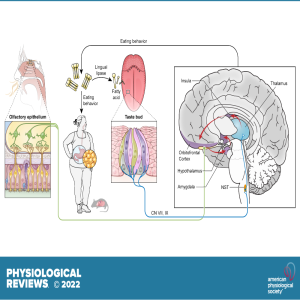
Wednesday Jan 04, 2023
A Systematic Review of the Biological Mediators of Fat Taste and Smell
Wednesday Jan 04, 2023
Wednesday Jan 04, 2023
Physiological Reviews Editor-in-Chief Dr. Sadis Matalon speaks with Dr. Paule V. Joseph about her article “A Systematic Review of the Biological Mediators of Fat Taste and Smell,” the first systematic review to be published in Physiological Reviews.
Dr. Joseph is Lasker Clinical Research Scholar, Tenure Track Clinical Investigator, and Chief of the Section of Sensory Science and Metabolism in the Division of Intramural Clinical and Biological Research at the National Institute of Alcohol Abuse and Alcoholism. She has a a joint appointment at the National Institute of Nursing Research. Dr. Joseph’s research focuses on preclinical, clinical, and translational studies of chemosensory disorders. In August 2022, she was selected as the inaugural 2022–2024 American Academy of Nursing Fellow at the National Academy of Medicine. Dr. Joseph is a member of the Physiological Reviews Editorial Board.
- Introduction of Dr. Joseph [1:07]
- Author’s background [2:40]
- Why did Dr. Joseph and her coauthors write a systematic review instead of a narrative review? [6:47]
- Discussion of the main receptors responsible for the sensations of taste and smell, and how their activation relates to obesity [10:12]
- How does SARS-CoV-2 result in loss of taste and smell, and why does it occur following a COVID infection and not with other respiratory viruses? [14:40]
- Are polymorphisms associated with obesity or, conversely, with very low body mass index (BMI)? [19:49]
- Do environmental factors play a role in the regulation of fat and smell receptors? [22:39]
- Suggestions for improving outreach within the nursing community [25:26]
Subscribe to the podcast on Apple Podcasts, Google Podcasts, Spotify, and Amazon Music to receive immediate notification when new episodes are available.
Browse recent articles on our website.
Be sure to let your colleagues know about the podcast, and please rate and review it wherever you listen to it.
Follow the journal on Twitter and Facebook.
Listen to other podcasts produced by the American Physiological Society.
